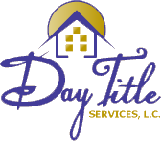FAQ
 When purchasing or refinancing real estate there are two components handled by Day Title Services, title insurance and settlement. This page discusses common questions asked about the both and settlement procedure. Some of these questions are also covered on individual Settlement page or Title Insurance page.
Please also review the
Settlement Process for additional questions and answers.
When purchasing or refinancing real estate there are two components handled by Day Title Services, title insurance and settlement. This page discusses common questions asked about the both and settlement procedure. Some of these questions are also covered on individual Settlement page or Title Insurance page.
Please also review the
Settlement Process for additional questions and answers.
- When will keys be available?
- What about getting utilities in my name?
- What about homeowners (hazard) insurance?
- Is a survey needed?
- Is an attorney needed?
- How should we take title on the deed?
- What happens if the deal falls through?
- What is an escrow account?
- What is a "HUD"?
When will keys be available?
If prior arrangements have not been made, keys should be available at settlement.
We make every effort to ascertain that arrangements are made for you to obtain the keys at settlement. You should also address this question with your real estate agent, or if no agent is involved, your seller, a few days prior to settlement.
What about getting utilities in my name?
You need to contact your utility company at least a week prior to settlement to have the account transferred to your name. Talk to your realtor and the seller about this, so the transfer is smooth.
What about homeowners (hazard) insurance?
Homeowner's insurance covers you against fire, theft, storm casualty, and liability. You need to select your own homeowner's agent. Many times the company that covers your automobile will give you a discount if you also place your homeowner's coverage with them.
Is a survey needed?
Surveys are ordered by Day Title if:
- Your lender requires it as a condition of the loan;
- You ask to have a survey done;
- A problem with the property description requires a survey to be done to resolve the uncertainty;
- An Enhanced Owner's Title Policy is desired by you and the seller does not have a survey, or will not sign the survey affidavit required for the Enhanced policy; or
- Commercial property is involved.
Is an attorney needed?
Having an attorney is an option. Both attorneys and non-attorneys may serve as settlement agents. Day Title Services LC is not a law office and does not give legal advice. Day Title serves as an escrow agent, to hold funds and documents on behalf of all parties (buyers, sellers, & lenders), conduct the settlement meeting, and disburse funds according to written instructions of the parties.
All settlement agents, whether attorney or non-attorney:
- must take education courses, including continuing education
- must pass licensing exams
- have fiduciary responsibilities to the consumer
- must follow state and federal laws and regulations as to collection and disbursement of funds
- must maintain real estate escrow accounts on which they earn no interest
- may have their licenses revoked for criminal activity
- are regulated by the Commonwealth of Virginia
- obtain Errors & Omissions insurance coverage, fidelity and surety bonds
In addition, settlement agents that are also title insurance agents:
- have their escrow accounts reviewed by each of their title insurance underwriters on an annual basis. Attorneys' escrow accounts are never audited or reviewed by the Bar Association or any other entity unless a complaint has been filed.
Most real estate purchases are primarily financial transactions, where the conditions of the loan and documents to be signed are established by the lender. A non-attorney settlement agent cannot give legal advice, but she can outline the contents of each document signed by the borrower. If the borrower wants the loan, he or she must sign the documents provided by the lender. If the borrower questions a document, he or she may call the Lender for clarification.
Day Title Services LC, a non-attorney settlement service provider, is a viable alternative for competent, economical settlement services.
How should we take title on the deed?
If more than one person is purchasing the real estate there are choices as to how title may be taken.
Standard definitions are:
- tenants by the entirety - a form of ownership by husband and wife where each owns an undivided interest in the real estate. In the event of death of one, the survivor owns the real estate without probate. Other than the federal government, creditors of one may not force the real estate to be sold to satisfy their debts. (Note: In Virginia most married couples own their residence in this manner.)
- joint tenants - when two or more owners take title, so that when one of them passes away their share passes directly to the remaining owners without probate; heirs of the deceased owner have no interest in the property. Creditors of any co-owner may have the property sold to satisfy debts of the co-owner.
- tenants in common - ownership form for multiple owners when no other is chosen. Property is inherited by heirs of the individual owners. Creditors can force the real estate be sold to satisfy the debt of one owner.
What happens if the deal falls through?
In the event your closing does not take place for any reason we will work with you regarding any "out of pocket" expenses that have occurred while we were preparing for your settlement. These cost include such items, as the cost of the abstractors time for work done in the Courthouse or perhaps for the Survey, when at your direction we have arranged for the work to be performed. Cancellations are handled on a case by case basis.
What is an escrow account?
An optional feature connected to your mortgage, an account set up and managed by your lender to pay your Real Estate Taxes, Home Owners Insurance, and Flood Insurance (if applicable). A portion of your monthly mortgage payment is held aside for payment of the above mentioned bills. Your escrow account will be periodically analyzed to determine if the amount being collected each month is excessive/insufficient to cover these bills. Your monthly payment could be adjusted if it proves to be too much or too little to pay the aforementioned bills.
What is a “HUD”?
Also known as a Settlement Statement. This is the government regulated document that outlines all costs/credits associated with your mortgage and/or purchase.
